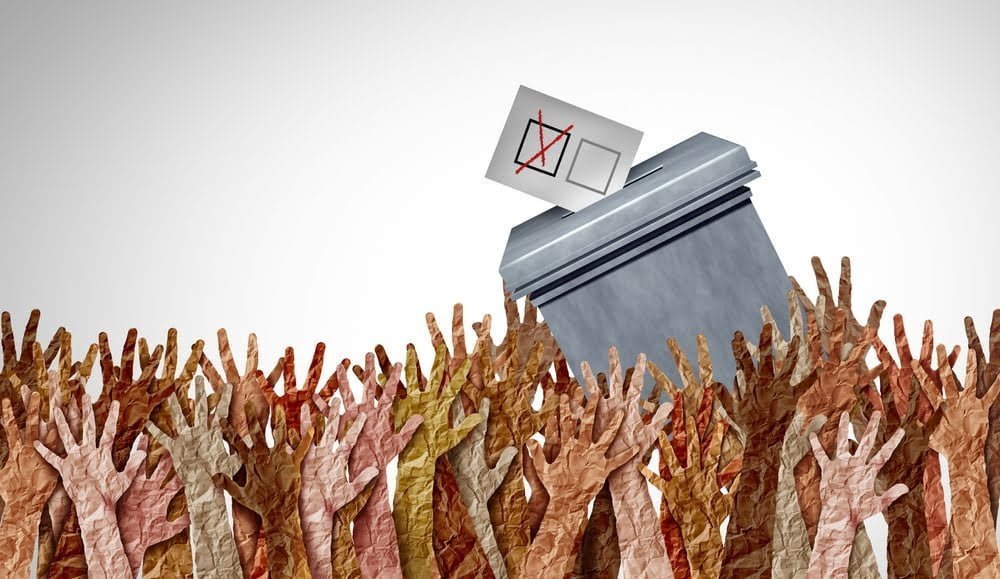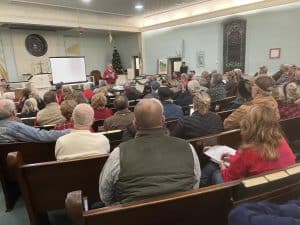With the 2024 election coming up, voters and journalists are still confused and concerned about different election laws across states and at the federal level. The Knight Foundation, a nonpartisan group that focuses on informing both the general public and journalists covering political news, hosted a forum partnered with Villanova University to discuss what laws Pennsylvania voters should note going into the election.
The event was co-moderated by Tracie Potts of the Eisenhower Institute at Gettysburg College and Katie Meyer of Spotlight PA, and panelists included former U.S. Rep Honorable Conor Lamb, former PA Secretary of State Kathy Boockvar and Committee of Seventy Chair Eric Kraeutler.
In Pennsylvania, the application for the mail-in or absentee ballots are due October 29 at 5 p.m. The ballots must be received by 8 p.m. on Election Day, but many parts of the process are currently being contested at both the state and federal levels.
Kraeutler explained the voting process for mail-in ballots. When you vote, you put the ballot in an envelope which conceals the identity of the voter. Then that is placed in a return envelope, which voters must sign and date, according to statute.
But he says the dating requirement is superfluous.
“The first is, it serves absolutely no purpose whatsoever. Every ballot has a barcode which is identified to the voter, and there is a recording of when that ballot is received. So that’s the only thing that matters in terms of whether the ballot is timely cast,” Kraeutler said. “The other thing you ought to know is that a lot of people screw it up. A very large number of people put their birthday instead of the date that they’re casting their ballot. Or they don’t fill the date in at all. So, this translated into more than 8 thousand ballots that had some sort of a defect in the envelopes in the April primary election and about half of those were over the dating requirements.”
While dating of mail-in ballots might be unnecessary, according to ACT 77, which was passed in 2019, a ballot might be rejected if the return envelope is not signed, it is missing a date, or if the secrecy line is missing. While some counties will tell voters if they made a mistake, that is not a requirement statewide. York County, for example, has said that they will not notify voters if they make mistakes on their mail-in ballots.
“I think a lot of times people don’t realize that all these differences are completely allowed under our statutory structure,” said Boockvar. “It’s a very decentralized system of elections, and this is across the country as well as in Pennsylvania. Just for context, I thought it was challenging that we have 67 different counties doing 67 different elections in Pennsylvania, but we actually have 9,000 election jurisdictions in the country. Three are 1,900 election jurisdictions in Wisconsin, 1,600 in Michigan, and 500 in Maine. So 67 counties is actually a walk in the park compared to that.”
Boockvar said lawmakers in Harrisburg could legislate changes to the process to make it uniform across the state, rather than have different rules in different counties. And while she did note that complete uniformity of elections could cause security issues and make it easier to overturn elections and therefore would not support national election laws, Boockvar did call for “a higher base of uniformity would be helpful to voters and it would be a good thing for election officials.”
According to a report done by the Pennsylvania chapter of the ACLU, if residents of Bucks County, Montgomery County and Philadelphia County make a mistake on mail-in ballots, they will be notified by phone, mail, and email from the county office that a mistake has been made and an opportunity will be given to fix it. The process is called “notice and cure” and is done in every county in Southeastern PA except Lancaster County. In that instance, the Department of State office will reach out and say a mistake was made and will explain to the voter how to cast a provisional ballot.
With Pennsylvania being seen as a potential deciding swing state for the 2024 presidential election, there have been many conspiracy theorists, some in office, saying that the state will rig the election in favor of Democrats. Although there was no evidence of fraud that was deemed usable in court in 2020, election officials have done their best to make the elections as safe as possible.
“It’s worth reminding your audience that’s not from Pennsylvania that everybody in PA is going to cast their ballot on a piece of paper that they are going to fill out by hand, except I think maybe some narrow categories of voters with disabilities,” said former Congressman Lamb. “You have to remember that because you’re going to hear people talking about machines and this and that and hacking. None of that really applies when you have actual pieces of paper that people voted and then they get fed into counting machines like a scantron test when you were a kid. So those votes can be recounted and audited in all sorts of ways to check for fraud.”
READ: Election Officials Across the Country Prepare for Threats with Panic Buttons, Bulletproof Glass
Lamb also pointed out that in Allegheny County, where he is from, they were counting votes live on national television back in 2020.
“And again, what I kept saying to my Republican friends,” he added, “was like ‘You can just go recount these. They’re all still there, it’s going to give you the exact same amount.’ So, that’s important for everyone to remember.”






